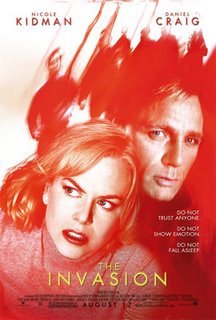
When food is reheated over and over again, it tends to dry out and lose its flavor. In a way, this would also describe
The Invasion. As the fourth cinematic adaptation of the classic sci-fi horror story,
Invasion of the Body Snatchers (which was previously filmed in 1956, 1978, and 1994),
The Invasion has its share of effective moments, but they don't seem quite as fresh as they once were due to the fact the story has been told so many times. It tries to modernize the story and tie it into some recent events such as the war in Iraq, but it doesn't go far enough with its own premise, and often comes across as warmed over cinematic left overs that has long lost the flavor and originality it once had.
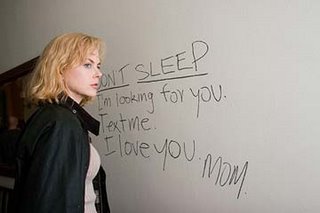
Single mom and therapist, Carol Bennell (Nicole Kidman), isn't sure what to think when a female patient walks into her office early in the film, and tells Carol that her husband is not her husband. The patient had been going through some troubles with her husband in the past, but now he is eerily calm and doesn't even seem to be the same person he once was. Slowly but surely, strange yet similar reports start happening all around Carol. People begin changing, losing their personality, and becoming hollow shells of the person they once were. The change seems to be caused by an alien virus that arrived on Earth when a shuttle crashed just days ago, and is now slowly infecting all the people of the world. With the help of her close friend, Ben (Daniel Craig), Carol is able to realize what is going on and also discovers that some are immune to this bizarre virus, including her young son Oliver (Jackson Bond). Oliver is currently being held captive by Carol's ex-husband, Tucker (Jeremy Northam), who has fallen victim to the alien disease and is under its control. With the virus attempting to take control of all the world's population, those who are immune will be exterminated. Carol must make her way through a world where no one can be trusted in order to track down her son before it's too late. Most importantly, Carol must stay awake, as she has been infected herself and if she falls asleep, she will become one of them.
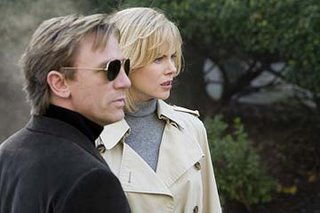
The events that unfolded during
The Invasion's trip to the big screen are almost as dramatic as anything that happens in the movie itself. The film was originally set to be released in the summer of 2006 under the helm of German director, Oliver Hirschbiegel. When his version scored poorly with test audiences and was deemed too slow, the studio ordered massive reshoots. Because Hirschbiegel was no longer available, the Wachowski Brothers (
The Matrix Trilogy,
V For Vendetta) were brought on to direct the new segments, even though they are not listed in the credits. It's painfully obvious watching the film when you're watching the material that was added on, as the film turns from a somewhat intriguing sci-fi paranoia thriller to an action thriller filled with lengthy car chases, shootouts, huge explosions, and a tacked on happy ending that seems like it was attached at the last minute and hastily thrown together. Before the sudden shift in tone during the third act, the movie at least manages to hold our interest, even if we have seen it all before too many times before. There are a number of effective scenes tied into the story's central theme of not knowing who to trust. As Carol makes her way through a city that is slowly falling apart, she is forced to show no emotion so that she can pass herself off as one of the infected. This leads to some powerful and painful moments, such as a scene where she is forced to watch two uninfected people leap to their deaths from a roof and try her hardest not to react, since she is surrounded by the infected and does not want to give herself away.
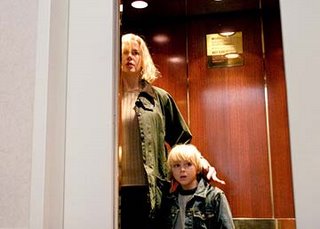
One odd thing that the movie does with his narrative is that he shoots the story somewhat out of sequence. The film opens with Carol frantically looting a pharmacy/grocery store, hoping to find any pills or caffeinated beverages that can help keep her awake. We can also hear someone pounding on a nearby locked door nearby. It then heads to the very beginning of the story, before the virus arrived on Earth. This is somewhat understandable, and a good way to get the audience's attention right off the bat. But then, at numerous other times throughout the story, he uses this technique again, and it's not as successful. At various times, he uses this "flash-forward" technique to explain how she escapes from other chases and situations, which obviously kills the tension more than just a little. A much more straight forward approach, where the fear and the paranoia would slowly build would have been a lot more successful and, most of all, appropriate for this kind of story. The film is also annoyingly simplistic at times, repeating its message over and over as if it thinks the audience somehow does not understand. Early in the film, during a dinner party, a man tells Carol that if there was no wars or poverty, we would not be human at all. Sure enough, when the alien virus starts infecting people and changing them into emotionless shells that barely resemble people, we keep on seeing news reports on the TV about the US suddenly pulling out of Iraq, the crime rate falls, and North Korea stops its nuclear program. It's an intriguing idea for sure, and it's an interesting criticism on human nature itself. But at the same time, it keeps this notion in the background the entire time, using only news reports to touch upon it. It keeps on repeating this idea, but never goes anywhere with it, which makes me wonder if there was more to this in a previous version of the film.
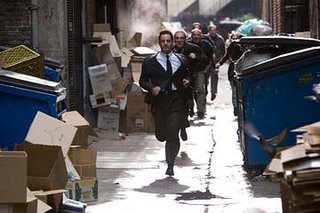
Despite its many problems, this is not an unwatchable film.
The Invasion is handsomely filmed, using its Washington DC setting to its advantage, and carries a strong cast of talent that help keep things believable no matter how out there the story gets at times. Nicole Kidman handles her role of Carol with the utmost seriousness, and makes us sympathize with her completely as she goes on a mad dash through a world gone insane to find her son. Even though this isn't usually the kind of material she's drawn to, she doesn't act like the material is beneath her, and creates a realistic heroine that we can relate to. As the male lead, Daniel Craig does the most of what he can with his underdeveloped character, and at least shows that he has good chemistry with Kidman during their scenes together early on in the film. It's a shame that his character is eventually dropped and almost forgotten about roughly half-way through, only to just suddenly show up again. The early half of the film concentrating on his relationship with Carol shows a lot of promise.
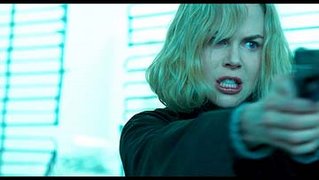
I have a feeling that the original version of
The Invasion that the studio received still had its share of problems, but I'm willing to bet that it did not cop out so completely during the all-important final moments. Perhaps a longer running time (the film is just over 90 minutes long) would have helped the movie flesh out some of its own intriguing ideas. It's obvious that everyone's heart was in the right place, but the movie never comes together due to the fact that the version being released in theaters is the result of massive tinkering and trying to guess what the audience wants out of the film. They should have let the film speak for itself instead of trying to second guess the people watching it.
0 comments
 When food is reheated over and over again, it tends to dry out and lose its flavor. In a way, this would also describe The Invasion. As the fourth cinematic adaptation of the classic sci-fi horror story, Invasion of the Body Snatchers (which was previously filmed in 1956, 1978, and 1994), The Invasion has its share of effective moments, but they don't seem quite as fresh as they once were due to the fact the story has been told so many times. It tries to modernize the story and tie it into some recent events such as the war in Iraq, but it doesn't go far enough with its own premise, and often comes across as warmed over cinematic left overs that has long lost the flavor and originality it once had.
When food is reheated over and over again, it tends to dry out and lose its flavor. In a way, this would also describe The Invasion. As the fourth cinematic adaptation of the classic sci-fi horror story, Invasion of the Body Snatchers (which was previously filmed in 1956, 1978, and 1994), The Invasion has its share of effective moments, but they don't seem quite as fresh as they once were due to the fact the story has been told so many times. It tries to modernize the story and tie it into some recent events such as the war in Iraq, but it doesn't go far enough with its own premise, and often comes across as warmed over cinematic left overs that has long lost the flavor and originality it once had. Single mom and therapist, Carol Bennell (Nicole Kidman), isn't sure what to think when a female patient walks into her office early in the film, and tells Carol that her husband is not her husband. The patient had been going through some troubles with her husband in the past, but now he is eerily calm and doesn't even seem to be the same person he once was. Slowly but surely, strange yet similar reports start happening all around Carol. People begin changing, losing their personality, and becoming hollow shells of the person they once were. The change seems to be caused by an alien virus that arrived on Earth when a shuttle crashed just days ago, and is now slowly infecting all the people of the world. With the help of her close friend, Ben (Daniel Craig), Carol is able to realize what is going on and also discovers that some are immune to this bizarre virus, including her young son Oliver (Jackson Bond). Oliver is currently being held captive by Carol's ex-husband, Tucker (Jeremy Northam), who has fallen victim to the alien disease and is under its control. With the virus attempting to take control of all the world's population, those who are immune will be exterminated. Carol must make her way through a world where no one can be trusted in order to track down her son before it's too late. Most importantly, Carol must stay awake, as she has been infected herself and if she falls asleep, she will become one of them.
Single mom and therapist, Carol Bennell (Nicole Kidman), isn't sure what to think when a female patient walks into her office early in the film, and tells Carol that her husband is not her husband. The patient had been going through some troubles with her husband in the past, but now he is eerily calm and doesn't even seem to be the same person he once was. Slowly but surely, strange yet similar reports start happening all around Carol. People begin changing, losing their personality, and becoming hollow shells of the person they once were. The change seems to be caused by an alien virus that arrived on Earth when a shuttle crashed just days ago, and is now slowly infecting all the people of the world. With the help of her close friend, Ben (Daniel Craig), Carol is able to realize what is going on and also discovers that some are immune to this bizarre virus, including her young son Oliver (Jackson Bond). Oliver is currently being held captive by Carol's ex-husband, Tucker (Jeremy Northam), who has fallen victim to the alien disease and is under its control. With the virus attempting to take control of all the world's population, those who are immune will be exterminated. Carol must make her way through a world where no one can be trusted in order to track down her son before it's too late. Most importantly, Carol must stay awake, as she has been infected herself and if she falls asleep, she will become one of them. The events that unfolded during The Invasion's trip to the big screen are almost as dramatic as anything that happens in the movie itself. The film was originally set to be released in the summer of 2006 under the helm of German director, Oliver Hirschbiegel. When his version scored poorly with test audiences and was deemed too slow, the studio ordered massive reshoots. Because Hirschbiegel was no longer available, the Wachowski Brothers (The Matrix Trilogy, V For Vendetta) were brought on to direct the new segments, even though they are not listed in the credits. It's painfully obvious watching the film when you're watching the material that was added on, as the film turns from a somewhat intriguing sci-fi paranoia thriller to an action thriller filled with lengthy car chases, shootouts, huge explosions, and a tacked on happy ending that seems like it was attached at the last minute and hastily thrown together. Before the sudden shift in tone during the third act, the movie at least manages to hold our interest, even if we have seen it all before too many times before. There are a number of effective scenes tied into the story's central theme of not knowing who to trust. As Carol makes her way through a city that is slowly falling apart, she is forced to show no emotion so that she can pass herself off as one of the infected. This leads to some powerful and painful moments, such as a scene where she is forced to watch two uninfected people leap to their deaths from a roof and try her hardest not to react, since she is surrounded by the infected and does not want to give herself away.
The events that unfolded during The Invasion's trip to the big screen are almost as dramatic as anything that happens in the movie itself. The film was originally set to be released in the summer of 2006 under the helm of German director, Oliver Hirschbiegel. When his version scored poorly with test audiences and was deemed too slow, the studio ordered massive reshoots. Because Hirschbiegel was no longer available, the Wachowski Brothers (The Matrix Trilogy, V For Vendetta) were brought on to direct the new segments, even though they are not listed in the credits. It's painfully obvious watching the film when you're watching the material that was added on, as the film turns from a somewhat intriguing sci-fi paranoia thriller to an action thriller filled with lengthy car chases, shootouts, huge explosions, and a tacked on happy ending that seems like it was attached at the last minute and hastily thrown together. Before the sudden shift in tone during the third act, the movie at least manages to hold our interest, even if we have seen it all before too many times before. There are a number of effective scenes tied into the story's central theme of not knowing who to trust. As Carol makes her way through a city that is slowly falling apart, she is forced to show no emotion so that she can pass herself off as one of the infected. This leads to some powerful and painful moments, such as a scene where she is forced to watch two uninfected people leap to their deaths from a roof and try her hardest not to react, since she is surrounded by the infected and does not want to give herself away. One odd thing that the movie does with his narrative is that he shoots the story somewhat out of sequence. The film opens with Carol frantically looting a pharmacy/grocery store, hoping to find any pills or caffeinated beverages that can help keep her awake. We can also hear someone pounding on a nearby locked door nearby. It then heads to the very beginning of the story, before the virus arrived on Earth. This is somewhat understandable, and a good way to get the audience's attention right off the bat. But then, at numerous other times throughout the story, he uses this technique again, and it's not as successful. At various times, he uses this "flash-forward" technique to explain how she escapes from other chases and situations, which obviously kills the tension more than just a little. A much more straight forward approach, where the fear and the paranoia would slowly build would have been a lot more successful and, most of all, appropriate for this kind of story. The film is also annoyingly simplistic at times, repeating its message over and over as if it thinks the audience somehow does not understand. Early in the film, during a dinner party, a man tells Carol that if there was no wars or poverty, we would not be human at all. Sure enough, when the alien virus starts infecting people and changing them into emotionless shells that barely resemble people, we keep on seeing news reports on the TV about the US suddenly pulling out of Iraq, the crime rate falls, and North Korea stops its nuclear program. It's an intriguing idea for sure, and it's an interesting criticism on human nature itself. But at the same time, it keeps this notion in the background the entire time, using only news reports to touch upon it. It keeps on repeating this idea, but never goes anywhere with it, which makes me wonder if there was more to this in a previous version of the film.
One odd thing that the movie does with his narrative is that he shoots the story somewhat out of sequence. The film opens with Carol frantically looting a pharmacy/grocery store, hoping to find any pills or caffeinated beverages that can help keep her awake. We can also hear someone pounding on a nearby locked door nearby. It then heads to the very beginning of the story, before the virus arrived on Earth. This is somewhat understandable, and a good way to get the audience's attention right off the bat. But then, at numerous other times throughout the story, he uses this technique again, and it's not as successful. At various times, he uses this "flash-forward" technique to explain how she escapes from other chases and situations, which obviously kills the tension more than just a little. A much more straight forward approach, where the fear and the paranoia would slowly build would have been a lot more successful and, most of all, appropriate for this kind of story. The film is also annoyingly simplistic at times, repeating its message over and over as if it thinks the audience somehow does not understand. Early in the film, during a dinner party, a man tells Carol that if there was no wars or poverty, we would not be human at all. Sure enough, when the alien virus starts infecting people and changing them into emotionless shells that barely resemble people, we keep on seeing news reports on the TV about the US suddenly pulling out of Iraq, the crime rate falls, and North Korea stops its nuclear program. It's an intriguing idea for sure, and it's an interesting criticism on human nature itself. But at the same time, it keeps this notion in the background the entire time, using only news reports to touch upon it. It keeps on repeating this idea, but never goes anywhere with it, which makes me wonder if there was more to this in a previous version of the film. Despite its many problems, this is not an unwatchable film. The Invasion is handsomely filmed, using its Washington DC setting to its advantage, and carries a strong cast of talent that help keep things believable no matter how out there the story gets at times. Nicole Kidman handles her role of Carol with the utmost seriousness, and makes us sympathize with her completely as she goes on a mad dash through a world gone insane to find her son. Even though this isn't usually the kind of material she's drawn to, she doesn't act like the material is beneath her, and creates a realistic heroine that we can relate to. As the male lead, Daniel Craig does the most of what he can with his underdeveloped character, and at least shows that he has good chemistry with Kidman during their scenes together early on in the film. It's a shame that his character is eventually dropped and almost forgotten about roughly half-way through, only to just suddenly show up again. The early half of the film concentrating on his relationship with Carol shows a lot of promise.
Despite its many problems, this is not an unwatchable film. The Invasion is handsomely filmed, using its Washington DC setting to its advantage, and carries a strong cast of talent that help keep things believable no matter how out there the story gets at times. Nicole Kidman handles her role of Carol with the utmost seriousness, and makes us sympathize with her completely as she goes on a mad dash through a world gone insane to find her son. Even though this isn't usually the kind of material she's drawn to, she doesn't act like the material is beneath her, and creates a realistic heroine that we can relate to. As the male lead, Daniel Craig does the most of what he can with his underdeveloped character, and at least shows that he has good chemistry with Kidman during their scenes together early on in the film. It's a shame that his character is eventually dropped and almost forgotten about roughly half-way through, only to just suddenly show up again. The early half of the film concentrating on his relationship with Carol shows a lot of promise. I have a feeling that the original version of The Invasion that the studio received still had its share of problems, but I'm willing to bet that it did not cop out so completely during the all-important final moments. Perhaps a longer running time (the film is just over 90 minutes long) would have helped the movie flesh out some of its own intriguing ideas. It's obvious that everyone's heart was in the right place, but the movie never comes together due to the fact that the version being released in theaters is the result of massive tinkering and trying to guess what the audience wants out of the film. They should have let the film speak for itself instead of trying to second guess the people watching it.
I have a feeling that the original version of The Invasion that the studio received still had its share of problems, but I'm willing to bet that it did not cop out so completely during the all-important final moments. Perhaps a longer running time (the film is just over 90 minutes long) would have helped the movie flesh out some of its own intriguing ideas. It's obvious that everyone's heart was in the right place, but the movie never comes together due to the fact that the version being released in theaters is the result of massive tinkering and trying to guess what the audience wants out of the film. They should have let the film speak for itself instead of trying to second guess the people watching it.






0 Comments:
Post a Comment
<< Home